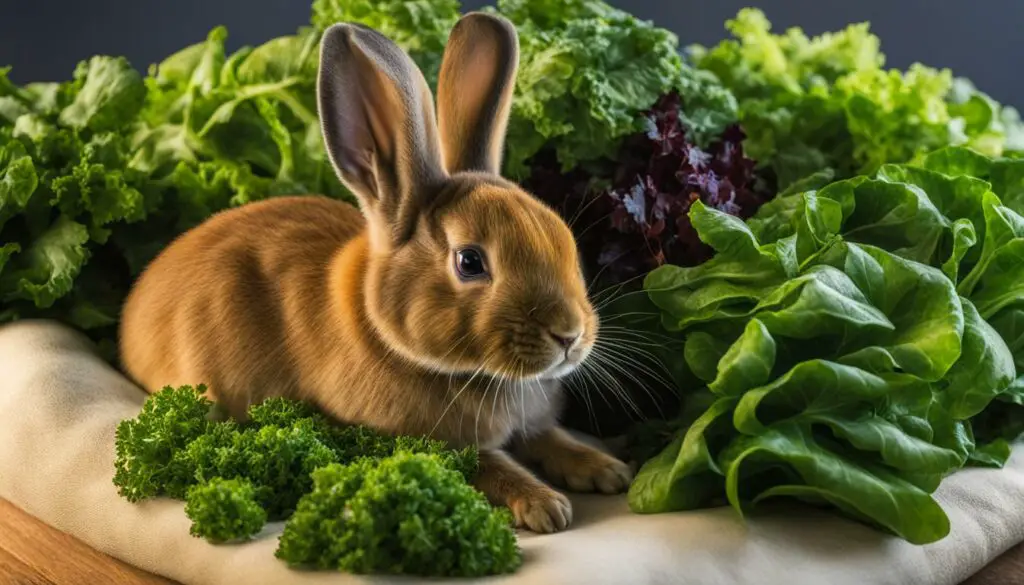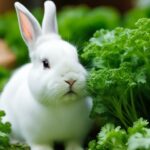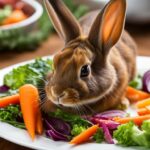Giving your rabbit a healthy, well-balanced diet is essential for their overall well-being. One important component of their diet is greens. Including a variety of leafy greens in your rabbit’s meals not only provides them with essential nutrients but also helps keep them hydrated. In this guide, I will provide you with all the information you need to know about feeding your rabbit the best greens for their diet.
When it comes to a rabbit’s diet, greens should make up around 8-10% of their daily food intake. The majority of these greens should be dark leafy greens, while fruits should be given sparingly. Offering about 1 cup of leafy greens per 2 pounds of your rabbit’s body weight per day is a general guideline to follow. It’s also important to introduce new foods gradually to avoid any digestive issues.
Some of the best leafy greens for rabbits include romaine lettuce, arugula, kale, spinach, parsley, and watercress. These greens provide essential vitamins, minerals, and fiber that are crucial for your rabbit’s health and well-being. However, it’s important to monitor your rabbit’s response to new greens and consult with a veterinarian if you have any concerns.
Key Takeaways:
- Greens are an essential part of a rabbit’s diet, providing them with important nutrients and hydration.
- Rabbit’s diet should consist of 70% high-quality grass hay, 20% pellets, and 8-10% greens and veggies.
- Dark leafy greens should make up the majority of the greens portion of a rabbit’s diet.
- Offer about 1 cup of leafy greens per 2 pounds of a rabbit’s body weight per day.
- Introduce new foods gradually to avoid digestive issues.
How Much Greens Does a Rabbit Need?
When it comes to feeding your rabbit greens, it’s important to provide them with the right amount to ensure a balanced diet. While every rabbit is unique and may have individual dietary needs, there are general guidelines that can help you determine the appropriate portion size. As a rule of thumb, it is recommended to feed around 1 cup of dark, leafy greens per 2 pounds of your rabbit’s body weight daily. This ensures they receive an adequate amount of essential nutrients without overdoing it.
In addition to leafy greens, non-leafy green veggies can also be included in your rabbit’s diet. It is suggested to offer about 1 tablespoon of non-leafy green veggies per 2 pounds of body weight. These can include options like bell peppers, broccoli, and Brussels sprouts. However, it’s important to introduce new foods gradually to avoid digestive upset and to monitor your rabbit’s response to ensure they tolerate them well.
Feeding charts based on various body weights can be a helpful reference to determine the proper portion sizes for your rabbit. By offering a variety of greens and veggies on a daily basis, you can ensure that your furry friend receives the necessary nutrients for their overall health and well-being.

Table: Recommended Portion Sizes of Greens for Rabbits
| Rabbit’s Body Weight | Leafy Greens (per day) | Non-Leafy Green Veggies (per day) |
|---|---|---|
| 2 pounds | 1 cup | 1 tablespoon |
| 4 pounds | 2 cups | 2 tablespoons |
| 6 pounds | 3 cups | 3 tablespoons |
Remember, it’s always best to consult with a veterinarian to determine the exact amount of greens that is appropriate for your specific rabbit. They can provide personalized recommendations based on your rabbit’s age, weight, and overall health. By feeding your rabbit the right amount of greens, you can ensure they thrive on a well-balanced diet.
The Benefits of Fresh Greens for Rabbits
Fresh greens are an essential part of a rabbit’s diet and offer numerous health benefits. They are packed with vitamins and minerals, providing rabbits with the nutrients they need to thrive. Leafy greens such as romaine lettuce, kale, and parsley are rich in vitamins A, B, C, and K, which help support immune function and overall wellness. These greens also contain soluble fiber, aiding in digestion and maintaining a healthy gut.
In addition to essential vitamins, fresh greens offer valuable trace minerals like iron, manganese, copper, and zinc. These minerals play a vital role in various bodily functions, including blood production, enzyme activity, and immune system support. By incorporating a variety of fresh greens into a rabbit’s diet, owners can ensure their pets receive a well-rounded, nutrient-rich meal.
Another significant benefit of fresh greens is their phytonutrient content. Phytonutrients are natural compounds found in plants that provide unique health benefits. They can act as antioxidants, reducing oxidative stress and inflammation in the body. These compounds also support cardiovascular health, aid in detoxification, and promote overall well-being. Including a variety of fresh greens in a rabbit’s diet can help boost their immune system, protect against illness, and contribute to their longevity.
| Fresh Greens | Nutritional Benefits |
|---|---|
| Romaine Lettuce | High in vitamins A and C, fiber, and minerals |
| Kale | Rich in vitamins A, B, C, and K, and minerals |
| Parsley | Excellent source of vitamins A, C, and K, and minerals |
| Dandelion Greens | Packed with vitamins A, B, C, and K, and minerals |
Remember to introduce new greens gradually and monitor your rabbit’s response. Not all rabbits tolerate every type of green, so it’s important to pay attention to any signs of digestive upset or allergies. Always consult with a veterinarian to ensure your rabbit’s diet meets their specific needs and promotes optimal health.
Recommended Leafy Greens for Rabbits
Leafy greens are an important part of a rabbit’s diet, providing essential nutrients and variety. Here are some recommended leafy greens that rabbits can enjoy:
- Romaine lettuce
- Arugula
- Kale
- Spinach
- Parsley
- Cilantro
- Watercress
These greens are not only delicious but also provide vitamins and minerals that contribute to a rabbit’s overall health. It’s important to gradually introduce new greens and monitor your rabbit’s response. Remove any uneaten greens after a couple of hours to prevent spoilage and ensure freshness.
Additionally, there are other suitable greens for rabbits, including dandelion greens, mustard greens, endive, chicory, and basil. These can be offered to provide variety in your rabbit’s diet. Always introduce new greens gradually and consult with a veterinarian if you have any concerns.
Remember, not all greens are suitable for rabbits. Avoid toxic greens like iceberg lettuce, onions, garlic, and tomato leaves and stems. Providing a balanced and varied selection of leafy greens will help support your rabbit’s health and nutrition.
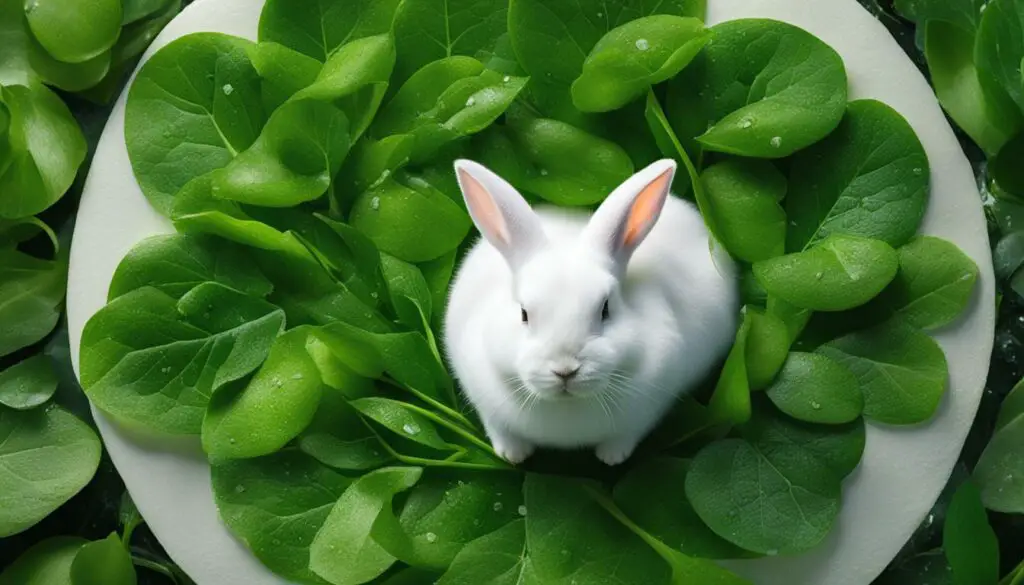
| Leafy Greens | Nutritional Benefits |
|---|---|
| Romaine Lettuce | Rich in vitamins A and K |
| Arugula | High in vitamin C and calcium |
| Kale | Loaded with vitamins A, C, and K, as well as calcium and iron |
| Spinach | Contains vitamins A, B, C, and K, as well as iron and calcium |
| Parsley | Rich in vitamins A and C, and a good source of iron |
| Cilantro | High in vitamins A and K, and a good source of calcium |
| Watercress | Loaded with vitamins A and C, as well as calcium and iron |
Considerations for Offering New Greens
When it comes to introducing new greens into your rabbit’s diet, there are a few important considerations to keep in mind. Some greens may have specific health implications for rabbits, so it’s essential to be aware of any potential risks before offering them to your furry friend. Here are a few key factors to consider when introducing new greens:
Potential Health Issues:
Certain greens, such as parsley, spinach, mustard greens, and Swiss chard, contain higher levels of calcium and oxalates. While these nutrients are beneficial in moderation, they can be problematic for rabbits with a history of bladder issues or urinary tract problems. It’s important to consult with a veterinarian if your rabbit has any pre-existing health conditions before introducing these greens into their diet.
Gastrointestinal Sensitivity:
Broccoli, Brussels sprouts, and cabbage are examples of greens that may cause gastrointestinal discomfort for some rabbits. These vegetables can be gas-producing and may lead to bloating or digestive upset. If you notice any signs of digestive distress, such as changes in stool consistency or decreased appetite, it’s best to remove these greens from your rabbit’s diet and consult with a veterinarian for alternative options.
By being aware of your rabbit’s individual health factors and monitoring their response to new greens, you can ensure that their diet remains balanced and beneficial. It’s always better to err on the side of caution and seek professional advice if you have any concerns about introducing new greens to your rabbit’s diet. Remember, the goal is to provide a nutritious and varied diet that promotes their overall health and well-being.
How to Feed Rabbit Pellets
Feeding rabbit pellets is an important part of a rabbit’s diet, although they should only make up a small portion, around 5%. Rabbit pellets are not essential, but they can provide additional nutrients to support your rabbit’s overall health. When choosing rabbit pellets, opt for those that have timothy hay as the main ingredient, as it is a high-quality source of fiber.
The exact amount of pellets to feed your rabbit depends on their size. As a general guideline, it is recommended to feed 2-5 tablespoons of pellets per day for a 4-pound rabbit. It’s essential to monitor your rabbit’s weight and adjust the amount of pellets accordingly to prevent overfeeding or underfeeding.
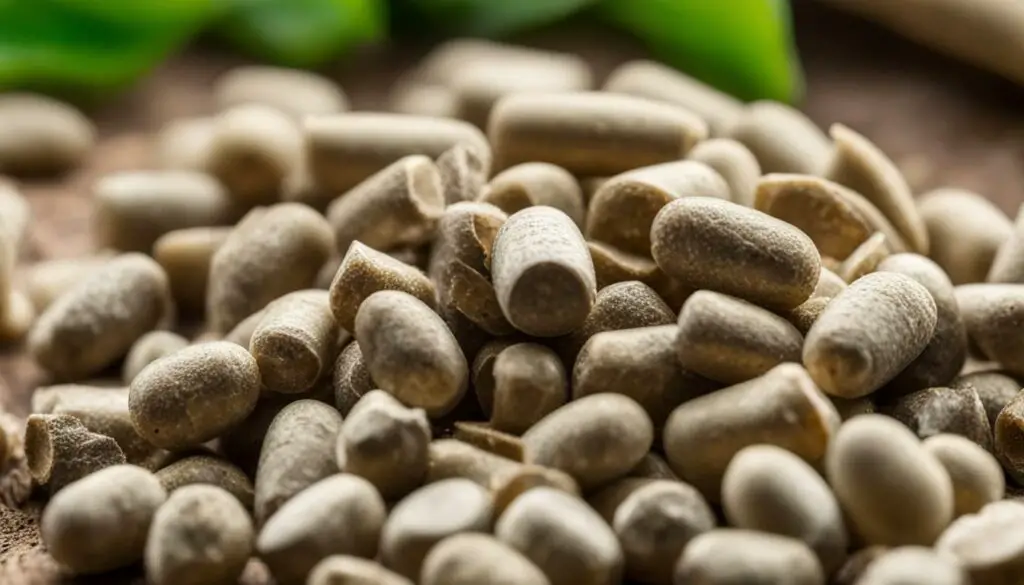
When feeding rabbit pellets, it’s important to distribute them throughout your rabbit’s enclosure or hide them in toys to provide mental stimulation. This encourages natural foraging behaviors and prevents boredom. It’s crucial to avoid using pellets with colorful, fruity pieces, as they are typically high in sugar and can lead to weight gain and digestive issues. Remember to always provide fresh drinking water alongside the pellets to ensure your rabbit stays hydrated.
Common Mistakes to Avoid
- Feeding excessive amounts of pellets: Rabbit pellets should only make up a small portion of your rabbit’s diet. Overfeeding pellets can lead to obesity and a lack of essential fiber from hay and fresh greens.
- Choosing low-quality pellets: Opt for pellets that primarily consist of timothy hay instead of those with fillers or additives. High-quality pellets provide the necessary nutrients for your rabbit’s health.
- Not monitoring portion sizes: It’s important to adjust the amount of pellets you feed your rabbit based on their weight and activity level. Regularly assess your rabbit’s body condition to ensure they maintain a healthy weight.
In summary, rabbit pellets are a supplemental part of a rabbit’s diet, providing additional nutrients. It’s important to choose high-quality pellets, monitor portion sizes, and distribute them throughout your rabbit’s enclosure. Remember to prioritize hay, fresh greens, and water as the main components of your rabbit’s diet to ensure their overall health and well-being.
Importance of Hay in a Rabbit’s Diet
Rabbits have a unique digestive system that requires a high-fiber diet to stay healthy. That’s why hay plays a crucial role in their overall well-being. Hay provides essential fiber that aids in digestion, maintains dental health, and prevents hairball blockages. It also engages a rabbit’s natural foraging instincts, keeping them mentally and physically active.
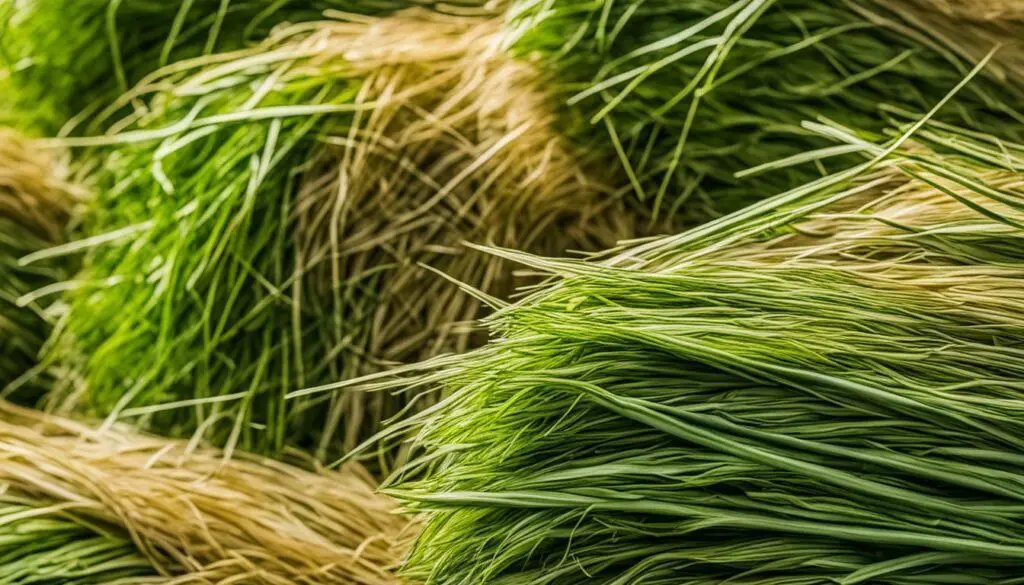
There are several types of hay available, but Timothy hay is the recommended choice as the main staple for rabbits. Other grass hays like Orchard, Meadow, or Herbal can also be included to provide variety in their diet. Each type of hay has its unique taste and texture, making mealtime more enjoyable for your furry friend.
It’s important to ensure that your rabbit always has access to fresh hay. Place it in a hay rack or provide it in a designated area of their enclosure. Some rabbits may also enjoy playing and burrowing in the hay, which provides mental stimulation and entertainment. Remember to check the hay regularly for freshness and replace it when it becomes soiled or wet.
Benefits of Hay in a Rabbit’s Diet:
- Provides essential fiber for digestion
- Maintains dental health
- Prevents hairball blockages
- Engages natural foraging instincts
- Offers mental stimulation and entertainment
Types of Hay for Rabbits:
| Hay Type | Description |
|---|---|
| Timothy Hay | Main staple hay for rabbits, suitable for all ages |
| Orchard Hay | Sweet and fragrant, provides variety in the diet |
| Meadow Hay | Mixed grass hay, offers different textures |
| Herbal Hay | Includes herbs like chamomile and lavender for added flavor |
By prioritizing hay in your rabbit’s diet, you can ensure they receive the essential nutrients they need to thrive. Remember to consult with a veterinarian for personalized recommendations based on your rabbit’s specific health and dietary needs.
Fresh Foods for Rabbits
As part of a healthy rabbit diet, fresh leafy greens play a crucial role in providing essential nutrients and variety. Including a variety of fresh foods not only adds dietary benefits but also stimulates your rabbit’s senses and encourages natural foraging behaviors. Here are some safe and nutritious options to consider:
| Fresh Greens | Safe Herbs |
|---|---|
| Arugula | Basil |
| Celery leaves | Cilantro |
| Chicory | Mint |
| Dandelion greens | Parsley |
| Fennel | Thyme |
| Spring greens | |
| Watercress |
When offering fresh foods to your rabbit, it’s important to cut them into bite-sized pieces to prevent choking. Additionally, introducing new foods gradually allows you to monitor your rabbit’s response and ensure they tolerate them well. Remember to always wash fresh produce thoroughly to remove any pesticides or residues before serving it to your furry friend.
Providing a varied diet of fresh greens, hay, and a small amount of pellets is key to maintaining your rabbit’s optimal health and happiness. Consult with your veterinarian for personalized dietary recommendations to meet the specific needs of your individual rabbit.
Toxic Foods to Avoid for Rabbits
When it comes to feeding your rabbit, it’s important to be aware of certain foods that can be toxic or harmful to their health. By avoiding these foods, you can help keep your furry friend safe and protect their well-being. Here are some foods that should be kept away from rabbits:
| Toxic Foods | Potential Harm |
|---|---|
| Avocados | Contain persin, which can be toxic to rabbits |
| Onions | Can cause gastrointestinal upset and damage red blood cells |
| Garlic | Similar to onions, can cause digestive issues and damage red blood cells |
| Iceberg Lettuce | Poor nutritional value and can cause diarrhea |
| Leeks | Can cause gastrointestinal upset and damage red blood cells |
| Potatoes | Contain solanine, which is toxic to rabbits |
| Mushrooms | Can cause digestive upset and potentially be toxic |
| Rhubarb | Contains oxalic acid, which can be harmful to rabbits |
| Tomato Leaves and Stems | Contain solanine, which can be toxic to rabbits |
Remember to always research any new foods before offering them to your rabbit, as even seemingly harmless foods can have unexpected risks. If you suspect your rabbit has ingested something toxic, it’s crucial to contact a veterinarian immediately for guidance on the best course of action.
Special Dietary Needs for Young, Pregnant, and Elderly Rabbits
Rabbits have different dietary needs at various stages of their life. It is essential to consider these special requirements to ensure their optimal health and well-being. In this section, we will discuss the specific dietary needs of young, pregnant, and elderly rabbits, providing you with valuable insights to properly care for your furry companions.
Diet for Young Rabbits
Young rabbits have higher nutritional demands due to their rapid growth and development. To support their growth, it is recommended to provide them with alfalfa hay, which is richer in calcium and protein than other hays. Additionally, a higher portion of pellets should be included in their diet to meet their increased energy and nutrient requirements. Consult with a veterinarian to determine the appropriate amount of pellets and hay based on your young rabbit’s weight and age.
Diet for Pregnant Rabbits
Pregnant rabbits require additional nutrients to support the development of their babies and milk production. It is crucial to offer unlimited amounts of alfalfa hay, which provides the necessary calcium and protein for the growing offspring. Along with hay, a higher portion of pellets should be provided to ensure adequate nutrient intake. Consult with a veterinarian for personalized dietary recommendations based on your pregnant rabbit’s condition and stage of pregnancy.
Diet for Elderly Rabbits
Elderly rabbits may require adjustments to their diet to accommodate their changing health and metabolism. It is important to monitor their weight and consult with a veterinarian to determine the appropriate diet for their individual needs. Depending on their health, an elderly rabbit may benefit from a decreased amount of pellets, as they are higher in calories. Additional dietary modifications, such as offering softer foods or providing supplements, may also be necessary to support their overall health and well-being.

By understanding and addressing the specific dietary needs of young, pregnant, and elderly rabbits, you can ensure that they receive the proper nutrition for their unique life stages. Remember to consult with a veterinarian for personalized dietary recommendations and guidance to provide the best care for your beloved bunnies.
Water and Hydration for Rabbits
When it comes to keeping rabbits healthy, hydration is key. Providing clean, fresh drinking water at all times is essential for their overall well-being. Whether you choose to use a water bottle or a bowl, it’s important to ensure that your rabbit has easy access to water throughout the day.
Rabbits have a high water intake compared to their body weight, so it’s crucial to monitor their water levels and refill as necessary. During hot weather, rabbits may drink more to stay hydrated, so be vigilant in keeping their water supply topped up. In colder temperatures, check that the water does not freeze over, as rabbits still need to drink even in chilly conditions.
To encourage water intake, you can try adding a few drops of fruit juice or vegetable broth to their water. However, it’s best to consult with a veterinarian before doing so, as rabbits have sensitive digestive systems and some additives may not be suitable for them.
Signs of Dehydration in Rabbits
It’s important to be aware of the signs of dehydration in rabbits, as prompt action can help prevent serious health issues. Some common signs to watch out for include:
- Thick or sticky saliva
- Loss of appetite
- Reduced or absent urine output
- Dry or sunken eyes
- Lethargy or weakness
If you notice any of these signs, it’s crucial to consult with a veterinarian to address the issue and ensure your rabbit receives the necessary treatment.
Summary
Keeping rabbits well-hydrated is vital for their overall health and well-being. Provide clean, fresh drinking water at all times, and monitor water levels regularly to ensure your rabbit has access to water. Be aware of the signs of dehydration and seek veterinary attention if you suspect your rabbit may be dehydrated. By prioritizing hydration, you can contribute to a happy and healthy life for your furry friend.

Treats for Rabbits
Treats can be a fun way to bond with your rabbit and provide them with a little extra something special. However, it’s important to remember that treats should only be given in moderation, as they can be high in sugar and disrupt the balance of a healthy diet. When choosing treats for your rabbit, opt for small pieces of fresh fruits and vegetables.
Some popular choices include apples, berries, and carrots. These treats can be offered occasionally as a special reward, but it’s important not to overdo it. Limit treat consumption to 1-2 tablespoons per day to maintain a balanced diet for your rabbit.
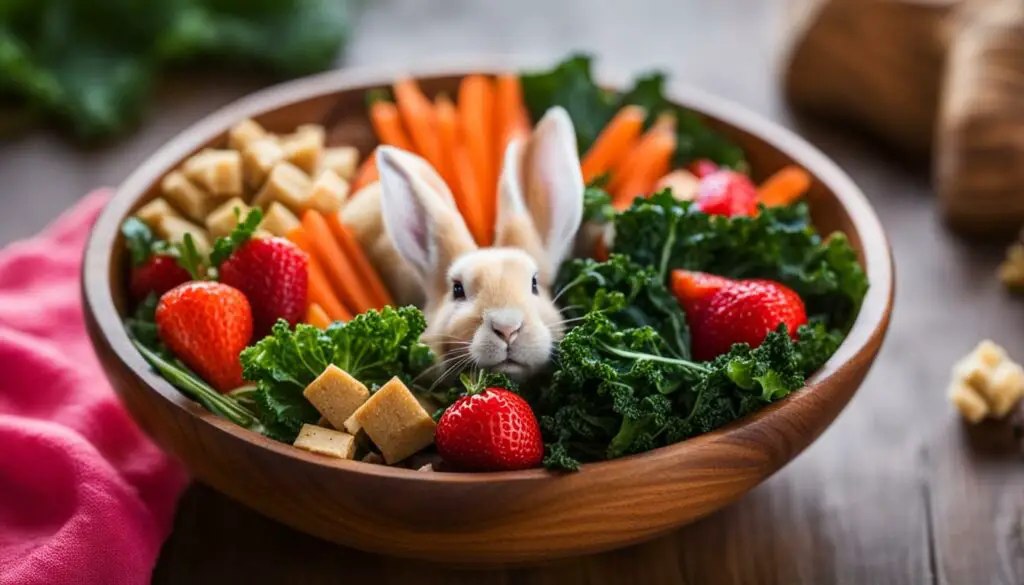
Pre-packaged treats from pet stores should be avoided or given in very small amounts, as they often contain added sugars and artificial ingredients that can be detrimental to your rabbit’s health. When offering treats, always ensure that they are fresh and free from any signs of spoilage or mold. Additionally, remember to cut up treats into small, bite-sized pieces to prevent choking hazards.
| Treat options | Serving size | Frequency |
|---|---|---|
| Apples | Small cubes or slices | Occasional |
| Berries | A few pieces | Occasional |
| Carrots | Small pieces or shreds | Occasional |
Remember, treats should never replace the main components of a rabbit’s diet, such as hay, pellets, and fresh greens. These items provide essential nutrients and help maintain proper digestion and overall health. If you have any concerns about your rabbit’s diet or treat options, consult with a veterinarian for personalized recommendations.
Conclusion
In conclusion, providing a well-balanced diet for your rabbit is crucial for their overall health and well-being. A healthy rabbit diet includes a variety of fresh greens, high-quality hay, and a small amount of pellets. By following these guidelines, you can ensure that your furry friend receives the essential nutrients they need to thrive.
Remember to consult with a veterinarian to determine the specific dietary needs of your rabbit, as individual requirements may vary. Regular check-ups and adjustments to their diet as they age or experience different life stages, such as pregnancy or old age, are important for their continued health.
Additionally, it’s important to provide fresh and clean drinking water at all times to ensure proper hydration. Water can be provided through a bottle or a bowl, depending on your rabbit’s preference.
Lastly, treats should be given sparingly and limited to small portions of fresh fruits and vegetables. Pre-packaged pet store treats should be avoided or given in very small amounts, as they can disrupt the balance of a healthy diet.
FAQ
How much greens does a rabbit need?
A general guideline suggests feeding around 1 cup of dark, leafy greens per 2 pounds of a rabbit’s body weight daily.
What are the benefits of fresh greens for rabbits?
Fresh greens provide essential nutrients, vitamins, minerals, and phytonutrients that support a rabbit’s overall health and well-being.
What are some recommended leafy greens for rabbits?
Some popular options include romaine lettuce, arugula, kale, spinach, parsley, cilantro, and watercress. Other suitable greens include dandelion greens, mustard greens, endive, chicory, and basil.
What should I consider when offering new greens to my rabbit?
It’s important to introduce new greens gradually and monitor your rabbit’s response. Some greens may be problematic for rabbits with specific health issues. Consult with a veterinarian if you have concerns.
How should I feed rabbit pellets?
Rabbit pellets should only make up a small portion of a rabbit’s diet, around 5%. Follow feeding guidelines based on the size of your rabbit and choose pellets with timothy hay as the main ingredient.
Why is hay important in a rabbit’s diet?
Hay provides essential fiber, aids in digestion, maintains dental health, prevents hairball blockages, and engages a rabbit’s natural foraging instincts. It should make up the majority of a rabbit’s daily food intake.
What fresh foods can I offer my rabbit?
Safe vegetables for rabbits include arugula, celery leaves, chicory, dandelion greens, fennel, spring greens, and watercress. Safe herbs for rabbits include basil, cilantro, mint, parsley, and thyme. Cut up fresh foods into bite-sized pieces for easy consumption.
What foods should I avoid feeding my rabbit?
Avoid feeding avocados, onions, garlic, iceberg lettuce, leeks, potatoes, mushrooms, rhubarb, and tomato leaves and stems, as they are toxic or potentially harmful to rabbits.
Do different rabbits have different dietary needs?
Yes, young rabbits, pregnant rabbits, and elderly rabbits may require adjustments to their diet based on their individual needs. Consult with a veterinarian for personalized dietary recommendations.
How important is water and hydration for rabbits?
Clean, fresh drinking water should always be available to rabbits. Hydration is essential for their overall health and well-being. Monitor water levels and refill as necessary to ensure proper hydration.
Can I give treats to my rabbit?
Treats should be given sparingly, as they can disrupt the balance of a healthy diet. Small pieces of fresh fruits and vegetables can be offered as occasional treats. Limit treat consumption to 1-2 tablespoons per day.

